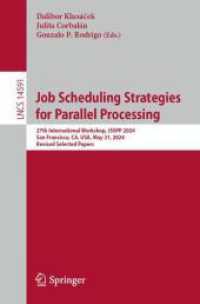- ホーム
- > 洋書
- > ドイツ書
- > Humanities, Arts & Music
- > Psychology
Full Description
This book applies a positive psychology perspective to theory, research and practice related to the teaching and learning of second/foreign languages (L2) for all ages, incorporating related fields of applied linguistics, education, and psychology. Central topics include positive psychological, cultural and social aspects of L2 learning experiences and environment contexts for usage of the L2, individual traits and strengths in L2 learners and teachers that enable people to thrive within the contexts of two or more languages. Chapters cover both positive second language "caring", "doing" and "being", focusing on the necessary factors for successful language learning as well as its impact on self and well-being.
Positive Psychology and Second Language Education aims to provide a holistic approach to understanding L2 teaching and learning from the perspective of positive psychology. It will be a useful resource for researchers and students in psychology, education, and L2 fields, as well as professional educators seeking to better understand the cognitive and linguistic research surrounding bilingualism.
Contents
Chapter 1 Introduction.- Positive Second Language Caring (PSLC).- Chapter 2 Positive Psychology in Second Language Teaching and Learning.- Chapter 3 Character Strengths and Second Language Learning.- Chapter 4 Positive Subjective Experiences of Second Language Learners.- Chapter 5 Positive Institutions in Second Language Learning: Using the Social Environment Lens.- Positive Second Language Doing (PSLD).- Chapter 6 Development of Positive Psychology in Second Language Teaching and Learning Across the Lifespan.- Chapter 7 Positive Formal and Informal Approaches of Learning in the Digital Age.- Positive Second Language Being (PSLB).- Chapter 8 Benefits of Bilingualism and Multilingualism.- Chapter 9 Bilinguals and Multilinguals Thriving Across Cultural Settings.








